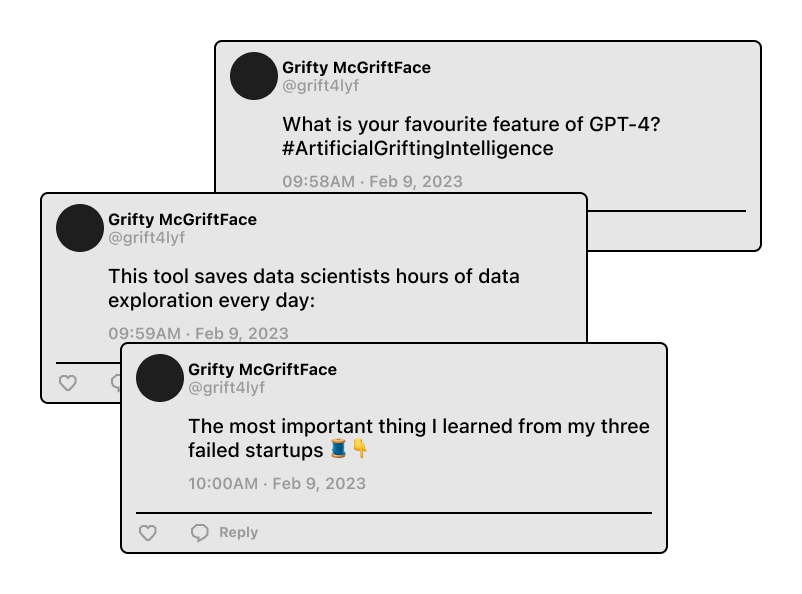Never grift
This isn’t the post I’d planned to send this week. I had been going to write a long and self-indulgent career history, and talk about what I’m doing now. Turning that into something someone else might want to read is taking time, so instead, I dug through my drafts, and found something that felt appropriate.
In my previous job, I wrote about data science and machine learning a lot. That isn’t all I did, but it was a substantial chunk. Perhaps substantive is a better choice: I like to think what I wrote had substance. By way of example, I’m particularly proud of this introduction to causality a colleague and I wrote. I think it does a good job for its intended audience of data scientists who are primarily concerned with predicting things. It took months to write, and we read more than one textbook to equip ourselves to do so. It was high effort.
If machine learning was hot then, it must be approaching the surface temperature of the sun now. Thus… an influx of grifters, to what was already a hype-prone technology.
I won’t define grifting. I think we all know what it is.

It’s posting low effort engagement bait. It’s making trivially false claims. It’s inflating the importance of something. It’s manufacturing false authority. It’s sales, with no product to sell. It is the absence of sincerity.
There is an absolute deluge of low to middling quality Medium articles (a portentous choice of name for the brand) alleging to teach some machine learning thing. Hallmarks of the genre are inflated and generic claims, an overly long title to squeeze in those SEO keywords (“XGBoost is the only algorithm you need as a data scientist working at a startup in 2023”), followed by some code snippets that work only on one machine, and only in particular circumstances, and in any case would be much easier divined from the documentation. I think this is driven by essentially the same forces as grifty tweets: we live in a clout economy.
I fear that some of the lower quality tutorials are written by early career folks, feeling pressure to have articles to their name. Sharing one’s understanding is a laudable goal, and I recognise that it is valuable to people new to a field to write tutorials as well as consume them, both didactically, and as a reputation building exercise. Certainly, given the ubiquity of Twitter among technologists, having a visible online presence is a career benefit. (Am I not engaged in fundamentally the same activity, right now? I am). But, aside from being condescending, I don’t think “beginners, right?” explains the phenomenon. My complaint is not that the internet is overrun by tutorials that are too introductory, it’s that we’re drowning in faux-educational content that is simply… bad. I put it to you that regardless of where you are in your career, you are better served by writing one good article than any number of poor ones.
I hereby promise never to grift. I won’t promise never to do anything low effort, because sometimes a low effort thing is still valuable (for instance, when an idea is novel and otherwise not going to be shared). But I’ll do my absolute best to always respect any prospective reader’s time. Anything you read from me will have been subject to thought from an actual, conscious human, making an earnest effort.
Chris
✌️